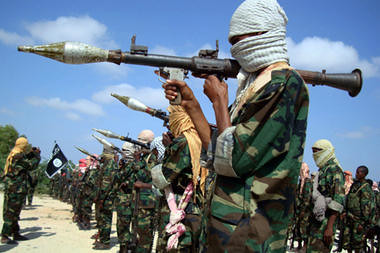
Somalia al-Shabab resistance fighters inside the country where a US-backed regime is attempting to dominate the Horn of Africa state. A notice about potential attacks in Kenya was discredited as a fake claim., a photo by Pan-African News Wire File Photos on Flickr.
General worried by terror collaboration in Africa
.By ROBERT BURNS
updated 9/14/2011 4:17:05 PM ET
WASHINGTON — The general responsible for U.S. military operations in Africa said Wednesday he is worried that three terrorist groups based on the continent are attempting to share training and to collaborate in other ways in pursuit of their goal of attacking the United States and other foreign targets.
Army Gen. Carter Ham, commander of U.S. Africa Command, told a group of reporters that each of the three — al-Qaida in the Islamic Magreb, Somalia-based al-Shabaab and Boko Haram — poses a "significant threat" not only in the areas in which they operate but also to the United States.
"Those three organizations have very explicitly and publicly voiced an intent to target Westerners and the U.S. specifically," Ham said. "I have questions about their ability to do so; I have no question about their intent to do so, and that to me is very worrying."
An even bigger concern, he said, is that the three are looking for ways to work together more closely. He said this is most apparent in efforts by al-Qaida in the Islamic Magreb, which is focused mainly on North Africa, and Boko Haram, a radical Muslim sect that wants strict Shariah law in Nigeria.
"They've expressed an interest in sharing training and operations and those kinds of activities, and that to me is very, very worrying," Ham said.
"So if left unaddressed, you could have a (terrorist) network that ranges from East Africa through the center" and into the Sahel, an area of north-central Africa south of the Sahara desert, Ham said. To varying degrees, these groups are affiliated with or inspired by al-Qaida's central organization in Pakistan.
Even before the killing in May of al-Qaida leader Osama bin Laden, U.S. officials were starting to focus more on other terror groups that aspire to carry out large attacks overseas.
U.S. counterterrorist operations have measurably degraded al-Qaida, killing eight of the group's top 20 leaders this year alone, Michael Vickers, the undersecretary of defense for intelligence, said Tuesday. He told an audience at the National Defense University that with sustained effort, "within 18-24 months, core al-Qaida's cohesion and operational capabilities could be degraded to the point that the group could fragment and exist mostly as a propaganda arm."
Ham and other senior U.S. officials have said they are concerned that as al-Qaida's core is dismantled, a number of affiliated terror groups in other regions are growing in significance and ambition. These include groups not only in North Africa but also on the Arabian Peninsula and in Somalia.
Ham declined to discuss specific U.S. counterterrorism activities aimed at reducing the threat in Somalia, such as the use of armed drone aircraft.
"I like the fact that al-Shabaab and other extremist leaders in some parts of the world don't know where we are, what we might do, what we are doing, what we're not doing," he said.
In a separate briefing for reporters at the Pentagon, three defense officials echoed Ham's concern about efforts by al-Qaida-affiliated groups, like those in Africa, to work together more closely.
The officials, who were granted anonymity to discuss sensitive intelligence analysis, also expressed worry that violent extremist groups are hoping to gain a foothold in post-Gadhafi Libya. One said the influx of foreign extremists into Libya appears to be modest so far but is a source of serious concern.
Ham made a similar point.
"This is a very legitimate concern of ours," the general said. "We have seen points in Libya in past years used as transit points for foreign fighters."
Ham said his main concern in Libya is the prospect of certain categories of weapons and materials falling into the wrong hands. Listing three categories in the order of their importance, he cited shoulder-fired anti-aircraft missiles, conventional munitions that could be used to build improvised explosive devices and chemical materials left over from Libya's partially dismantled chemical weapons program.
___
AP Intelligence Writer Kimberly Dozier contributed to this report.
No comments:
Post a Comment